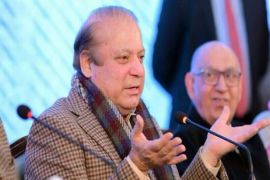Prime Minister Nawaz Sharif on Wednesday approved the removal of moratorium on death penalty after the carnage in Peshawar killed 141 people.
Addressing an All Parties Conference (APC) in Peshawar, the premier announced that the moratorium on death penalty, which was imposed under international pressure, has been lifted.
“The prime minister has abolished the moratorium on death penalty in terrorism-related cases,” an official from Nawaz's office said.
Soon after resuming office, the newly-elected government of Prime Minister Nawaz Sharif had said it wanted to reinstate the death penalty in a bid to crack down on criminals and militants.
In this respect, the government had decided to hang four convicts on death row in August last year. However, a temporary stay was ordered on these executions following objections from Pakistan Peoples Party (PPP) co-chairman Asif Ali Zardari and rights groups.
A day before, Jamiat Ulema-i-Islam - Fazl (JUI-F) Secretary General Maulana Abdul Ghafoor Haidri had said in a press conference that a moratorium on death penalty was encouraging terrorists and had limited counter-terrorism actions in the country.
Maulana Haidri, who is Minister of State for Postal Services, had said that the state had no right to suspend the death penalty.
“Only a victim’s kin has the right to pardon the killer with or without taking compensation. This is an Islamic way of justice and being an ideological state Pakistan should have Islamic laws,” he had said.
The JUI-F leader had also said terrorists did not fear the writ of law only because the punishment for heinous crimes like murder and terrorism was practically negligible.
Pakistan has reportedly one of the largest death row populations in the world with more than 8,000 prisoners sentenced to death. Some 150 countries have abolished the death penalty or no longer carry out executions.
Pakistan's moratorium drew praise because of concerns its courts and police were too inept to ensure the accused a fair trial. However, a convicted murderer and a former army serviceman was executed in 2012.







